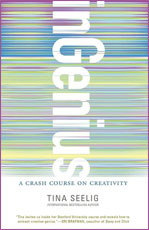"The title of this book, inGenius, reflects the fact that we each have creative genius waiting to be unlocked. The word 'ingenious' is derived from the Latin term ingenium, which means natural capacity or innate talent. For centuries people have questioned these natural talents and looked outside themselves for the source of creative inspiration. The ancient Greeks believed there were goddesses, called Muses, who inspired literature and art, and they worshipped them for their powers. Later, in Elizabethan England, William Shakespeare invoked his muse when writing sonnets, often beseeching her for help. Ideas often feel inspired and, therefore, it made sense to beseech a muse for inspiration. However, we now know that it is really up to you to ignite your inborn inventiveness.
"Many people question whether creativity can be taught and learned. They believe that creative abilities are fixed, like eye color, and can't be changed. They think that if they aren't currently creative, there is no way to increase their ability to come up with innovative ideas. I couldn't disagree more. There is a concrete set of methods and environmental factors that can be used to enhance your imagination, and by optimizing these variables your creativity naturally increases. Unfortunately, these tools are rarely presented in a formalized way. As a result, creativity appears to most people to be something magical rather than the natural result of a dear set of processes and conditions.
"It might seem counterintuitive to use a set of tools to enhance creativity, since creativity necessitates doing things that haven't been done before. But a guide is just what we need. Just as scientists adopt tried-and-true scientific methods to design experiments, enhancing your creativity benefits from a formal set of tools for idea generation. Consider the fact that we are taught how to use the scientific method from the time we are children. Starting at an early age, we learn how to make hypotheses and to test them in order to discover how the world in which we live works. We learn how to ask probing questions, to unpack all the assumptions, and to design experiments to reveal the answers. This important skill and the associated vocabulary are honed for years until they become quite natural.
"The scientific method is clearly invaluable when you are trying to unlock the mysteries of the world. However, you need a complementary set of tools and techniques — creative thinking — when you want to invent rather than discover. These two endeavors are completely different, but they work in concert. Like the scientific method, creative thinking uses well-defined tools, demystifies the pathway for invention, and provides a valuable framework for creating something new. Successful scientists and innovators in all fields move back and forth between discovery and invention, using both scientific and creative thinking processes. In fact, most great scientists are also accomplished inventors who pose the most innovative questions and invent ingenious methods to test their scientific theories. It is time to make creative thinking, just like the scientific method, a core part of our education from the time we are children, and to reinforce these lessons throughout our lives."
